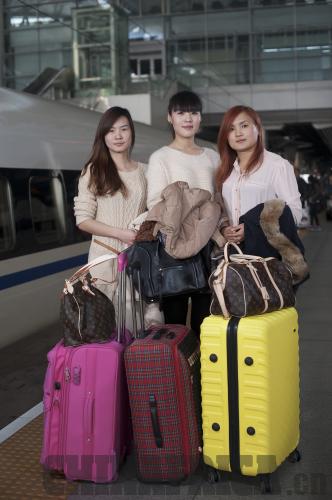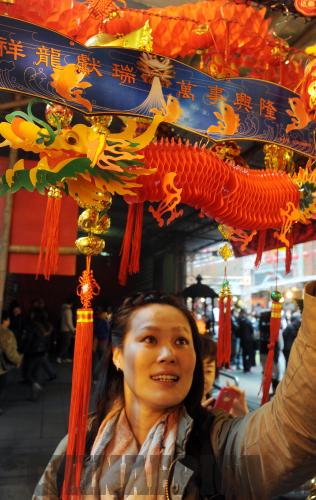|
 |
|
Ready to make the long journey home during for Spring Festival |
Like Christmas in the West, Chinese New Year, or Spring Festival, remains the most important social and economic holiday in China. But a survey conducted by Horizon Key Research at the end of 2012, two months before Chinese New Year, which fell on February 10 this year, indicated that over 70 percent of young people in China feel stressed about the celebration.
Due to a clash between centuries-old traditions and modern life, China's young people have increasingly complex feelings about Spring Festival, and now observe and spend the holiday in a very different manner than previous generations.
Holiday pressure
"If I go home without a boyfriend, all the relatives will keep asking me why I don't have one," said Zheng Ting, a 25-year-old woman working for a foreign company in Beijing.
With families reuniting for the holiday, Chinese New Year has been seen as a time to introduce a potential spouse - one's boyfriend or girlfriend - to the family. In Zheng's hometown, a small town in Jiangsu Province most women her age have already had a child, and her mother has been anxious for Zheng to bring someone home. The pressure doubles when the gathered relatives begin to enquire about the lack of a boyfriend and line up potential candidates.
"I feel so awkward talking to them," said Zheng, who admitted that she feels somewhat reluctant to return home.
Among all the reasons cited by young people for their nerves about going home for Chinese New Year, pressure on singles to settle down was mentioned most often. Shortly before the New Year holiday, in January, the same topic triggered an online debate that garnered over 40,000 replies all focused on the key words "pressure to marry."
This pressure has even given rise to a new industry. Searching for "boyfriend for rent" on Taobao, the biggest online market in China, returns over 400 results: starting at as little as 100 yuan ($16) per day, one can rent a boyfriend or a girlfriend to take home for Chinese New Year.
In addition to pressuring young people to marry, extended family members also tend to grill their children, nieces and nephews about other personal topics like salaries, career prospects and buying a house - all under the guise of caring concern, of course.
 |
|
Spring Festival means big sales for retail outlets and tourism companies |
A new problem
While singles feel harassed during the holiday, young couples have a hard time before Chinese New Year.
It has been more than three decades since the implementation of the one-child policy, and the first generation of only children born under the policy have got married. Many of these young people migrated to larger cities to attend university. After graduation, they stayed to work and then got married. But now they face a new problem: deciding whose family to visit for Chinese New Year.
According to national census figures, China has 178 million people over the age of 60. As urban populations have boomed with an influx of migrant workers and young people from the countryside, half of China's elderly have been left home alone, a situation analysts call "empty nesting."
New Year's Eve dinner is traditionally one of the most important times for family to be together. But when it comes to newly-married couples who grew up as only children, the yearly ritual means tough decisions and arguments.
"Because I am the only child, going to visit my spouse's parents means that my parents will have a lonely Spring Festival," commented a netizen named MissA, who suggested that the annual conflict be resolved by visiting each family on alternative years. "So far, this is the fairest way to address the problem," she wrote.
Different reunion
"Chunyun," or China's "Spring Festival Migration" is a popular subject every year in the weeks leading up to the Chinese New Year. This year, over 3 billion trips were made during the Spring Festival.
Purchasing train tickets for the trip home has become a collective national headache, especially for those working in big cities. During this year's 40-day-long travel rush, around 37 million people passed through Beijing.
But before New Year Eve, tickets from outer regions to big cities are relatively easier to get, and that's how Cheng Yiran deals with ticket-buying madness - she arranges for her parents to do the traveling and has them spend Spring Festival with her in Beijing.
"Every year we did nothing but visit relatives, and it got a little bit boring," said Cheng, who has worked in Beijing for four years since graduating from college. "This year, I showed them around. I wanted them to have an opportunity to enjoy life in a big city."
The 26-year-old Tian Gu used to be one of those tortured by inquisitive relatives asking about his love life each Spring Festival, but this year was different. On the first day of the New Year holiday, Tian and her parents were sitting on a plane heading to Hainan Island off the south most tip of China.
During this year's Spring Festival, the tourism industry is expected to experience a 20-percent bump over numbers from the same period last year. The number of tourists traveling during the Spring Festival holiday in 2012 topped 176 million across the country, according to the National Tourism Administration. Although the tickets can be twice as expensive, travel is becoming one of the most popular ways to spend Spring Festival.
The decision not to return home has the added bonus of solving another holiday conundrum. Tradition dictates that adults should give money to children they see during the New Year. But in recent years, the accepted standard for this monetary gift has surged to as much as 500 yuan ($80.6) in certain regions, making New Year's visits a huge financial burden for young people just starting their careers.
"People now don't have to adhere to traditions like staying at home and eating dumplings," said Tian. "No matter where we are or what we do, the point is we spend time with family." CA |